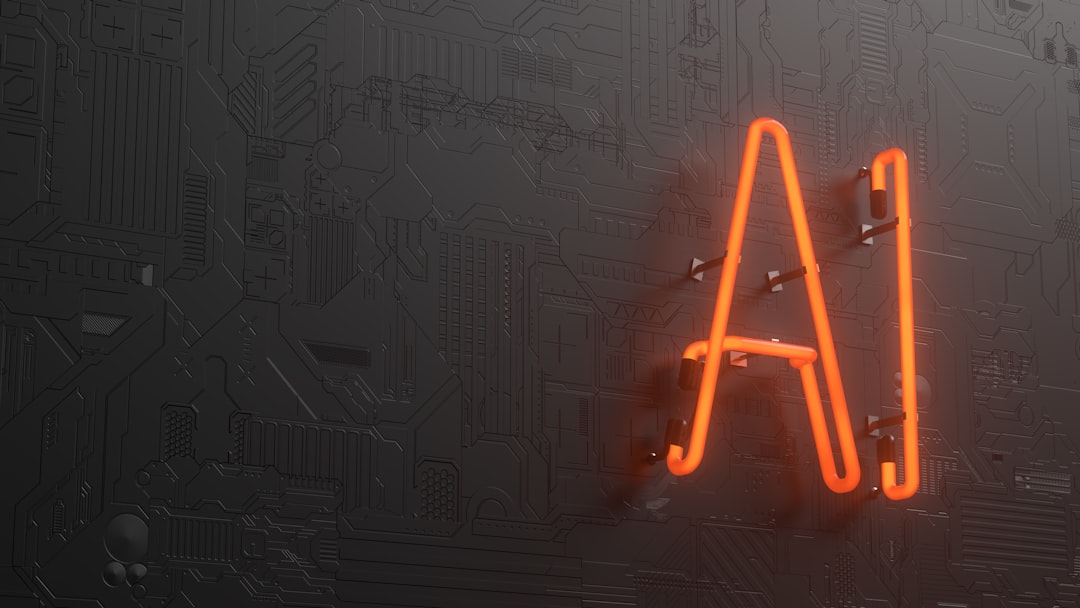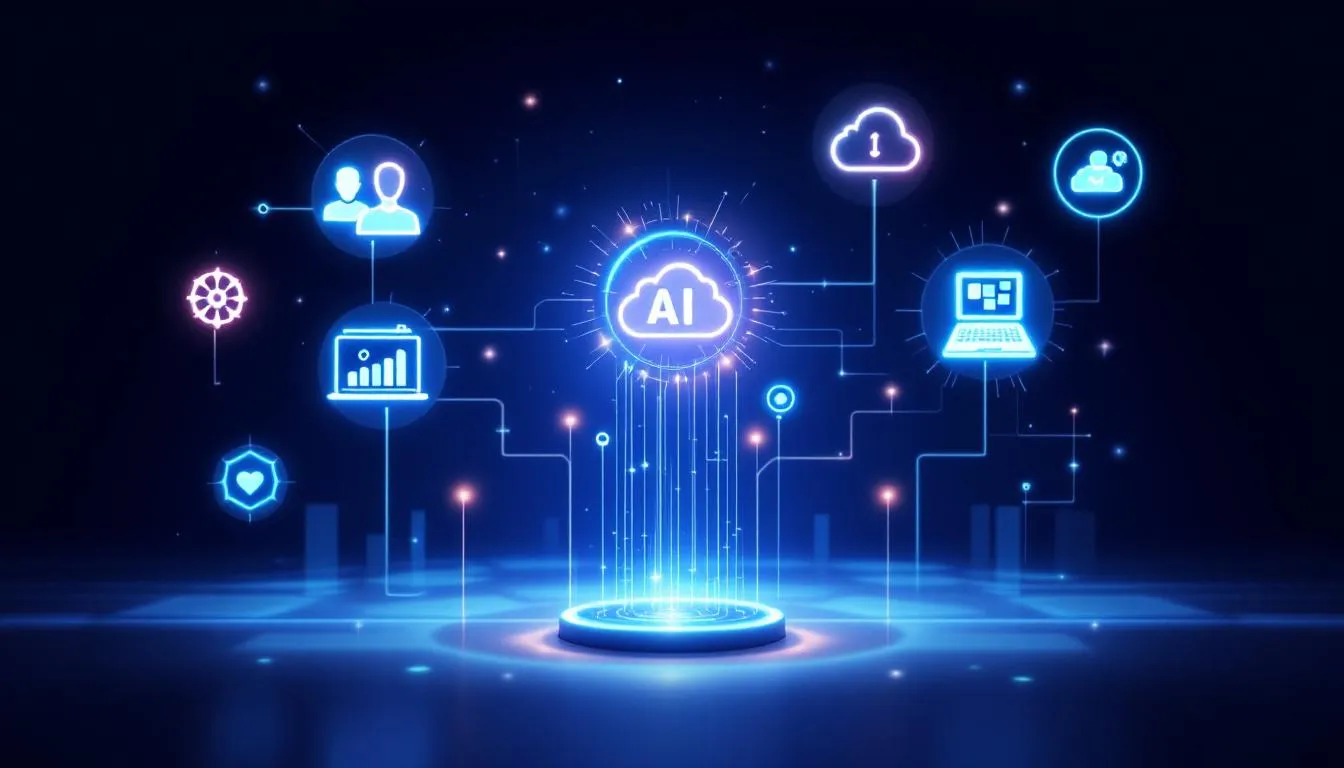
Mastering Productivity: How to Use AI to Be More Productive
Want to know how to use AI to be more productive? This guide will show you how AI can automate your tasks, provide better insights, and streamline your workday. Discover actionable tips and real-world examples to enhance your productivity with AI.
Key Takeaways
- Leverage AI tools for task automation to free up time for high-value activities and improve overall productivity.
- Utilize AI for data analysis to enhance decision-making, optimize inventory management, and drive strategic, data-driven choices.
- Implement AI-powered solutions in training and project management to create personalized learning experiences and streamline collaboration.
Leveraging AI Tools for Task Automation

The rapid advancement of AI tools is reshaping the business landscape, creating new opportunities to enhance productivity and drive economic growth. Automating repetitive processes with AI allows employees to concentrate on high-value activities, enhancing efficiency and collaboration.
Generative AI, in particular, can handle tedious tasks, allowing employees to dedicate more time to important tasks.
Automating repetitive tasks
AI is well-suited for automating repetitive tasks. Data entry and analysis are prime examples of such tasks. Tools such as Robotic Process Automation (RPA) can handle various repetitive tasks, including customer service requests, significantly reducing the time and effort required to manage these routine activities. Moveworks AI Assistant, for instance, transforms conversations into automated workflows, streamlining repetitive processes.
Email management, a notorious time-consumer, can be streamlined using AI. Microsoft Copilot Pro helps automate email management tasks, reducing the time spent on inbox activities. AI email assistants categorize emails and generate reply drafts, ensuring that your inbox is managed efficiently.
These advancements in task automation allow employees to maximize increased productivity by focusing on a single task that is more strategic work and creative.
AI assistants for daily activities
AI assistants are designed to autonomously perform tasks based on user commands, streamlining daily operations. These assistants can simplify the scheduling process, removing the need for back-and-forth communication. For instance, Reclaim optimizes scheduling by rearranging your schedule to protect time for important tasks.
Integration between AI tools and platforms enhances productivity further. For example, tools like Zapier can automate follow-up workflows by adding items to Notion databases when new Google Calendar events are created.
These AI systems not only save valuable time but also ensure that important tasks are not overlooked, allowing for a time saved and more efficient and organized workday.
Enhancing Decision-Making with AI Analysis
AI enhances decision-making by analyzing vast datasets, providing insights for more informed, data-driven choices. Successful integration of AI requires aligning initiatives with business objectives, ensuring that AI tools effectively support organizational goals.
Utilizing best practices in deploying AI can enhance data-driven decision-making processes while maintaining ethical standards.
Analyzing historical data
AI can significantly enhance strategic planning by identifying trends from historical data through predictive analytics. This detailed analysis allows businesses to draw conclusions and make data-driven decisions that align with their strategic objectives, ultimately driving growth and efficiency.
Predictive analytics for forecasting demand
Using AI for demand forecasting allows organizations to make informed decisions about inventory levels based on predicted sales. AI analyzes sales patterns and predicts future sales, helping businesses manage their inventories more effectively and reduce waste.
Predictive analytics tools also foresee potential benefits, delays, budget issues, or resource constraints, allowing for proactive supply chain management. By integrating these insights, businesses can optimize their operations, ensuring that supply meets demand without significant hiccups.
Boosting Creativity and Content Creation

Generative AI can enhance creativity in content creation by:
- Assisting creators in ideation and drafting.
- Streamlining the content creation process, allowing creators to focus more on refining their ideas and less on the initial drafting phase.
- Helping creators save time and overcome writer’s block by assisting with initial drafts.
Generating initial drafts
AI models serve as co-writers to help produce initial drafts quickly. These AI tools can generate draft content rapidly, helping writers bypass obstacles like writer’s block without compromising quality. The collaboration between AI and humans expedites the production of draft text, allowing for a smoother content creation process.
These tools generate copy and convert plain text into formatted documents, aiding the content creation process to produce content. This not only saves time but also ensures that the content is polished and ready for publication more quickly.
AI for quality improvement
AI-driven editing tools can provide detailed feedback on writing quality, helping authors improve clarity and engagement in their content. Generative AI can also assist in visual content creation by optimizing designs based on user inputs, enhancing overall aesthetic appeal.
AI automates quality control, helping businesses maintain consistent branding and messaging across platforms. This ensures that all content meets the desired standards, ultimately improving the overall quality of the output. Understanding how ai works in this context is essential for maximizing efficiency.
Improving Customer Experience with AI Applications

AI-driven platforms can provide immediate responses to inquiries via virtual assistants, improving communication efficiency among teams. AI tools can automate responses to common questions and answer questions, allowing businesses to address customer inquiries more swiftly.
Furthermore, AI technology enhances customer interactions by processing large datasets to deliver tailored experiences that meet customer preferences.
Automate responses to customer inquiries
AI chatbots offer several advantages:
- They can predict the reasons behind customer inquiries, allowing for more efficient and relevant responses.
- Platforms like Zapier enable businesses to build chatbots that provide effective customer support solutions.
- AI chatbots handle routine inquiries, reducing the workload of human agents and enabling them to focus on more complex customer issues.
AI chatbots are crucial for efficiently managing customer inquiries, ensuring swift responses and improving the overall customer experience. This automation streamlines processes and enhances customer satisfaction by addressing their needs promptly.
Personalizing customer interactions
AI analyzes customer behavior and past purchases, enabling businesses to tailor their offerings. This personalization enhances the customer experience, making interactions more relevant and engaging.
AI tools analyze customer problems and customer feedback, enabling businesses to create meaningful connections that boost loyalty and satisfaction. This targeted approach ensures that customers feel valued and understood, leading to better overall outcomes with the help of an ai tool.
Streamlining Project Management and Collaboration

AI project management tools enhance scheduling, budgeting, and team collaboration by utilizing data analytics and intelligent automation. AI provides clarity on tasks, optimizes processes, and helps complete tasks effectively.
Generative AI enables teams to integrate multiple inputs into cohesive content, enhancing collaboration using generative ai tools to use AI to Be More Productive.
AI-powered project management tools
AI plays a crucial role in project management by enabling task delegation, progress tracking, risk assessment, and resource optimization. Tools like Asana offer AI-powered features for smart goals, identifying project risks, and providing project answers, facilitating effective project management.
Other tools like Any.do help by generating tasks and providing AI suggestions, which enhance streamlined project task management. The Motion tool specializes in project management and task tracking, helping users stay organized and on target with project deadlines.
Enhancing collaboration with AI
AI facilitates better communication by automating routine messages and organizing information. Integrations like Avoma-Slack send instant messages to Slack for new conversations, enhancing real-time communication. Tools such as DALL.E can create images based on Slack messages, aiding in visual information sharing.
AI automates routine messages, streamlining workflows and improving team collaboration.
Maximizing Productivity in Knowledge Work
Generative AI has the biggest impact of generative ai on knowledge work, particularly in decision-making and collaboration. Using generative AI can improve employee productivity by 66%, equating to 47 years of natural productivity gains. Using AI to Be More Productive can help automate routine tasks, freeing the workforce for more complex work.
AI in research and development
AI significantly enhances data analysis, allowing for faster identification of patterns and trends. With AI, researchers can swiftly analyze large datasets and extract meaningful insights that would otherwise take much longer to uncover.
The use of machine learning in solar energy research has improved forecast accuracy by 30%, showcasing a real-world application of AI. This demonstrates technology’s potential to drive innovation and efficiency in various fields.
Optimizing document management
AI tools can automate the organization of documents, significantly reducing search times. Efficient document management is crucial for maintaining productivity and ensuring that critical information is readily available.
AI tools automate document organization and improve information retrieval, enhancing productivity in work processes. Artificial intelligence enhances knowledge management by quickly locating required information from vast databases.
Utilizing AI for Effective Training and Skill Development
AI tools are increasingly used in corporate training to create more effective solutions, moving beyond traditional training methods. AI can enhance training by analyzing employee data to tailor learning experiences that match individual strengths and weaknesses using machine learning algorithms.
AI aids in spotting skill gaps within organizations to tailor training initiatives effectively.
Personalized learning paths
AI can create tailored learning experiences by analyzing individual learner data and adjusting content delivery based on their unique needs. Learning pathways designed by AI adapt in real time to reflect learner progress and preferences, making education more engaging and effective.
AI can assess individual performance metrics to design training paths that cater specifically to each employee’s learning pace. This customization improves training outcomes and ensures that employees receive the support they need to succeed.
Faster learning curves
Using AI to Be More Productive can reduce the time it takes for employees to become proficient by providing adaptive and interactive learning opportunities. With AI assistance, employees experience a more engaging training environment, enhancing retention and application of learned skills.
Agents achieve expertise four times faster when supported by AI agents. New agents can complete an average of 2.0 inquiries per hour with AI support. Typically, it takes just 2 months for agents to reach their productivity level with AI support.
Integrating AI into Business Processes
Successful adoption of AI requires aligning technology with business goals and preparing the workforce for change. To effectively implement AI, organizations should adopt a structured approach that includes pilot projects followed by scaling successful initiatives using a foundation model.
Establishing clear policies is essential for preventing the misuse of generative AI technologies.
Identifying potential AI applications
Assessing business processes can uncover specific tasks where AI can drive efficiency. Businesses should evaluate existing workflows to optimize processes and identify specific areas where AI can enhance performance and efficiency.
Key factors in selecting AI applications include potential ROI, ease of implementation, and alignment with strategic objectives. Systematic assessment of these factors allows businesses to increase productivity through effective AI implementation.
Ensuring seamless integration
Integrating AI to Be More Productive with current systems often requires a phased approach to minimize disruption and ensure user adoption. This phased approach allows businesses to gradually integrate AI into their workflows, ensuring that employees are comfortable and proficient with the new technology. Ensuring interoperability with existing systems is crucial for seamless integration, as it prevents bottlenecks and maintains productivity.
A user-friendly experience for employees is vital for successful AI integration. Training programs and support systems should be in place to help employees adapt to AI tools and the user interface. This ensures that the workforce can leverage AI’s full potential, leading to enhanced productivity and streamlined business processes.
Managing Risks and Ethical Considerations in AI Use
Managing risks and ethical considerations in AI is crucial to ensure that technologies support organizational values and do not harm individuals or communities. This involves implementing fairness audits to evaluate AI systems and mitigate biases that may affect outcomes, as part of effective risk management.
Continual evaluation and adjustment of AI systems are necessary to adapt to changing societal values and address emerging risks.
Responsible AI deployment
Responsible AI focuses on creating systems that are ethically aligned with societal values and enhance human decision-making. This involves designing AI systems that are transparent, accountable, and fair. Aligning AI initiatives with ethical standards builds trust with stakeholders and ensures AI technologies serve the greater good.
Deploying AI responsibly also means integrating AI in ways that complement and enhance human capabilities. AI should not replace human judgment but rather augment it, providing insights and support that lead to better decision-making and outcomes.
Mitigating potential risks
Conducting impact assessments helps organizations understand how AI systems affect various stakeholders. These assessments identify risks related to data handling and security in AI implementations, allowing organizations to take proactive measures to mitigate these risks. By adhering to privacy regulations and implementing robust security protocols, businesses can protect sensitive data from unauthorized access and potential breaches.
Effective strategies for mitigating AI risks include thorough impact assessments and continuous monitoring of AI systems. This ongoing vigilance ensures that AI technologies remain aligned with ethical standards and organizational values, minimizing potential negative impacts on stakeholders.
Summary
In conclusion, the integration of AI to Be More Productive across various business processes offers immense potential for productivity gains, enhanced decision-making, and improved customer experiences. By automating routine tasks, leveraging AI for data analysis, and utilizing AI-driven tools for content creation and project management, organizations can unlock new levels of efficiency and innovation.
As we move forward in this new era of AI, it is crucial to manage risks and ethical considerations responsibly. By deploying AI systems that align with societal values and continuously evaluating their impact, businesses can ensure that AI technologies contribute positively to their goals and to society as a whole. Embrace the potential of AI, and watch as it transforms your productivity and business success.
Frequently Asked Questions
How can AI automate repetitive tasks in the workplace?
AI to Be More Productive can significantly boost productivity by automating repetitive tasks like data entry and email management, allowing you to concentrate on more important, value-driven work. Embrace these innovations, and watch your efficiency soar!
How does AI improve decision-making in businesses?
AI improves decision-making in businesses by analyzing large datasets to provide valuable insights, enabling smarter, data-driven choices. By utilizing predictive analytics, businesses can forecast trends and optimize operations for more effective strategic planning.
What role does AI play in content creation?
AI plays a crucial role in content creation by generating drafts, offering feedback, and helping creators overcome writer’s block. Embrace these tools to enhance your creativity, save time, and maintain consistency in your messaging!
How can AI enhance customer experiences?
AI to Be More Productive can significantly enhance customer experiences by automating responses and personalizing interactions tailored to individual preferences. By using AI chatbots and virtual assistants, you can ensure immediate and relevant communication, leading to higher satisfaction and efficiency.
What are the ethical considerations in deploying AI?
To ethically deploy AI, focus on fairness, transparency, and accountability. Regular audits and impact assessments can help align AI systems with societal values and minimize biases, empowering you to make a positive impact.
